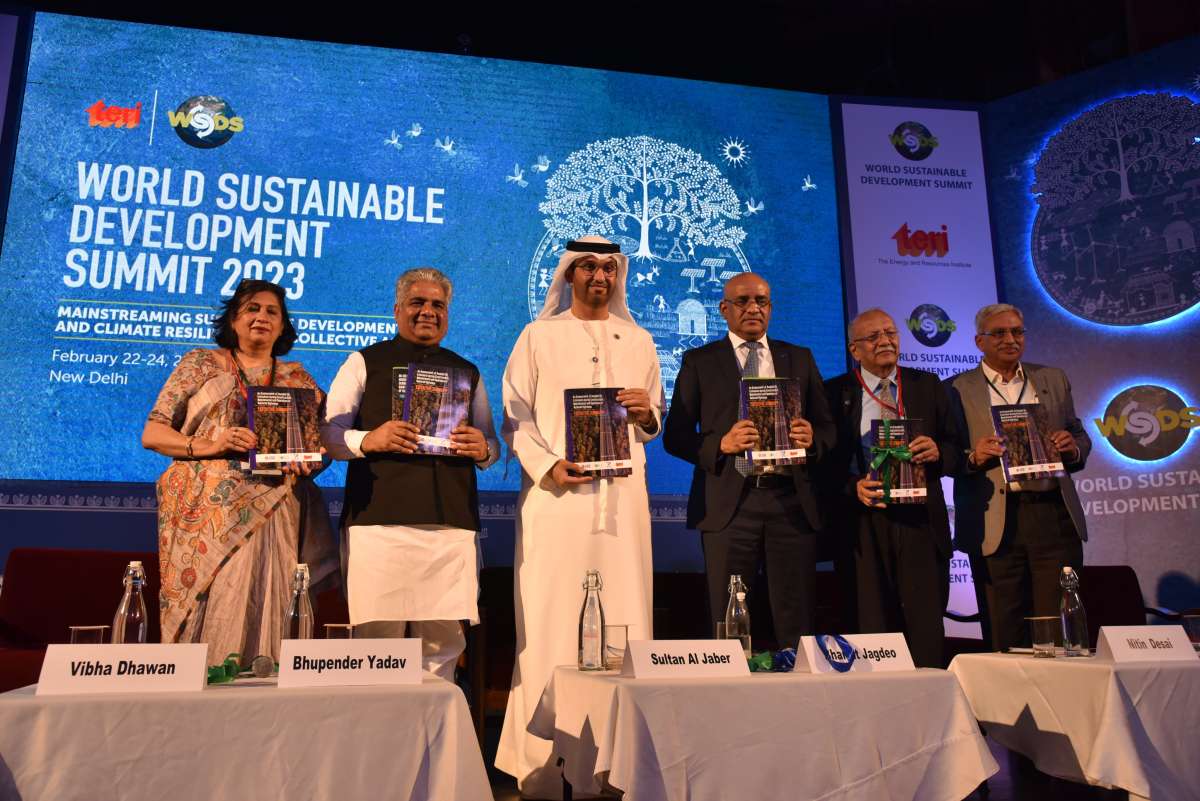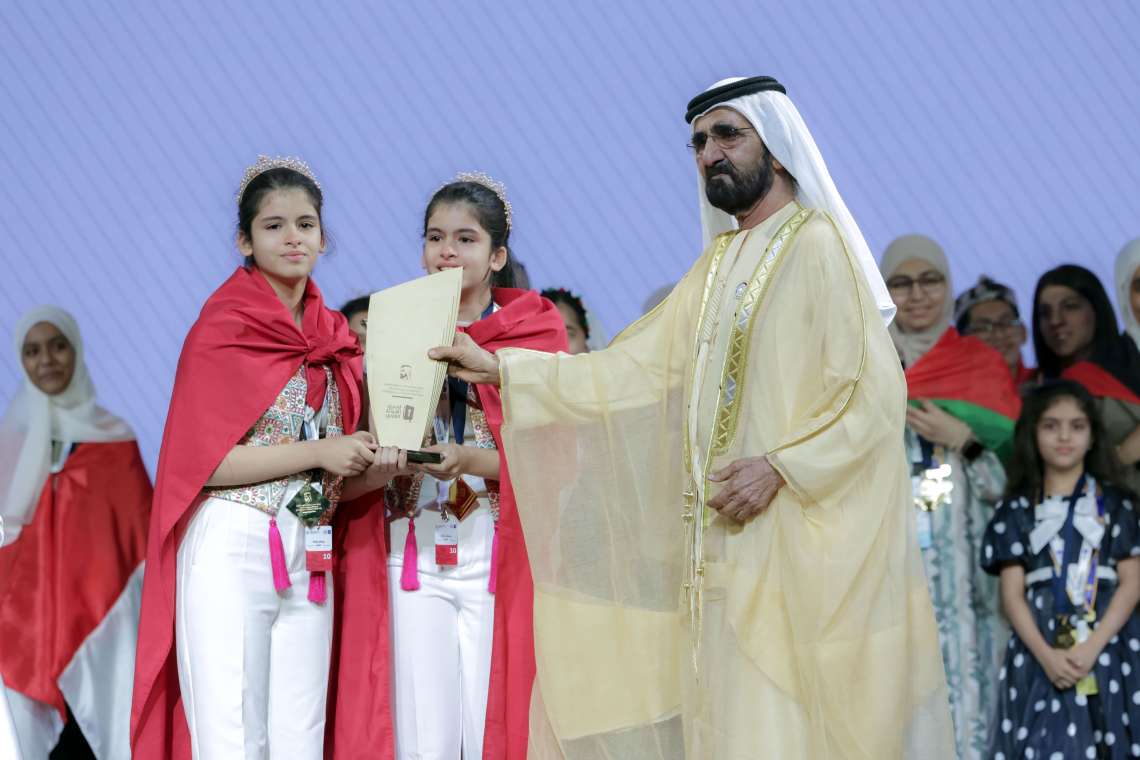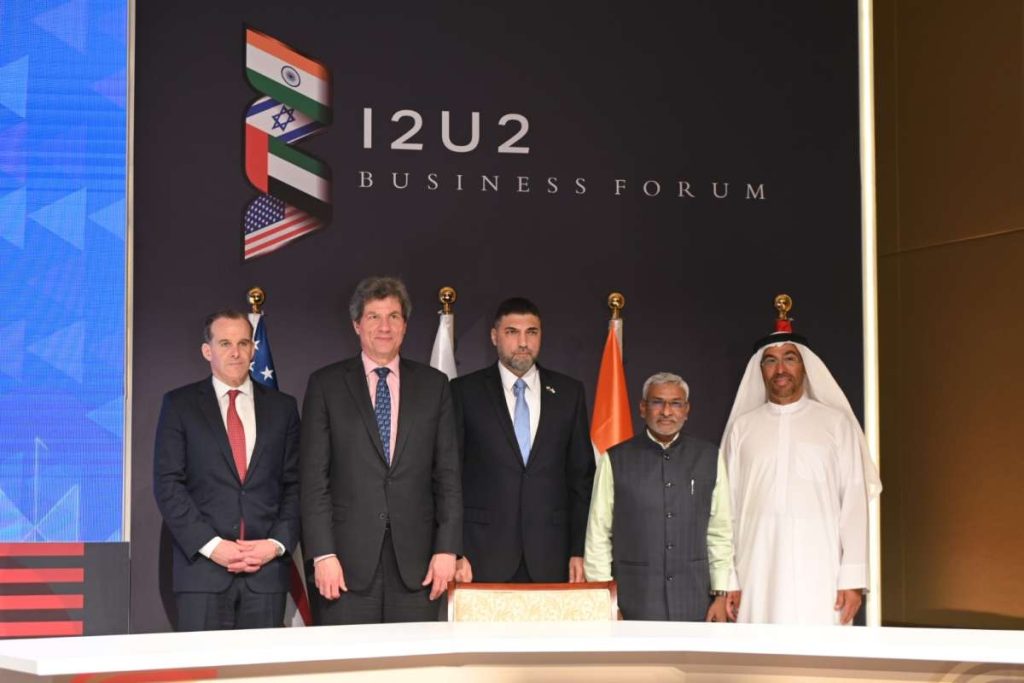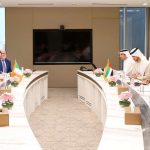Sultan Al Jaber was speaking at the World Sustainable Development Summit hosted by The Energy and Resources Institute (TERI) in New Delhi….reports Asian Lite News
COP28 UAE President-Designate Dr. Sultan Al Jaber has emphasised the need to mobilise resources and partnerships toward a bold and transformative approach to climate action. Al Jaber also said the Paris Agreement goal of limiting global temperature rise to 1.5 degrees Celsius is non-negotiable.
Speaking at the World Sustainable Development Summit hosted by The Energy and Resources Institute (TERI) in New Delhi, Al Jaber recognised India’s prominent global role and noted that the country, which assumes the Presidency of the G20 this year, is soon to become the world’s third largest economy.
The president-designate of the 28th Conference of the Parties (COP28) said, “India’s sustainable development is critical, not just for India, but for the whole world. India’s goal of adding 500GW of clean energy in the next seven years is a powerful statement of intent. And, as one of the largest investors in renewables, the UAE will explore all opportunities for partnership with India to contribute to its high growth, low carbon pathway.”
Recognising Prime Minister Narendra Modi’s leadership as guiding India on its path to a prosperous and sustainable future, he emphasised the UAE’s support for India’s G20 focus on transformative action towards a cleaner, greener, and bluer future, with just and equitable growth for all.
Highlighting that “The UAE takes on the role of COP28 with humility, a deep sense of responsibility and great sense of urgency”, Al Jaber reaffirmed the UAE’s unwavering commitment to the Paris Agreement goal of limiting global temperature rise to 1.5 degrees Celsius but stressed that progress was far from what was needed.
“Let me make one thing absolutely clear: The goal of keeping 1.5 alive is non-negotiable. It is also clear that business as usual won’t get us there. We need a paradigm shift in our approach to mitigation, adaptation, finance, and loss and damage.”
Reflecting on the key pillars of climate negotiations, Al Jaber outlined key priorities across mitigation and adaptation.
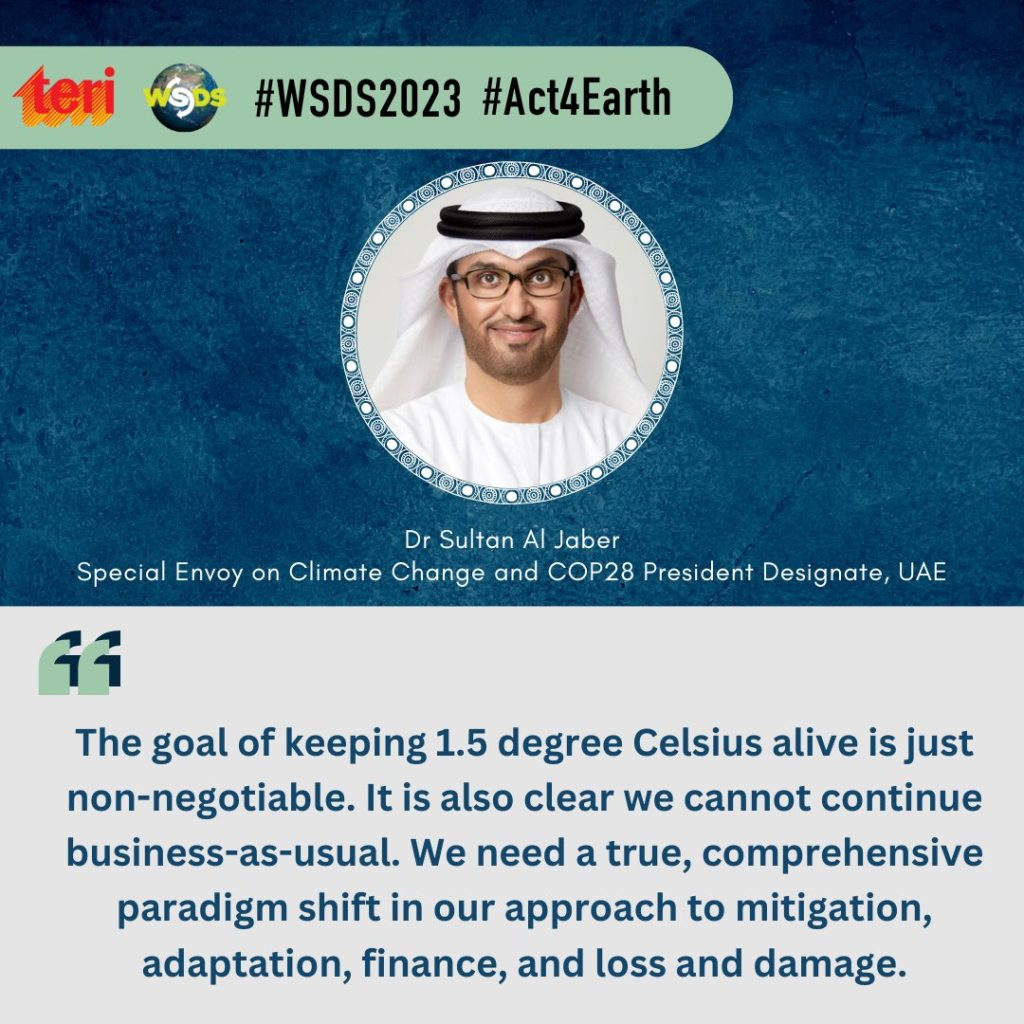
“On mitigation, we need to rapidly build the clean energy systems of tomorrow, while making the energy systems of today much cleaner. We must triple renewable energy capacity, double hydrogen production, expand nuclear power, improve battery storage, scale up carbon capture and enhance efficiency. And we need to accelerate an energy transition that leaves no one behind, particularly the 800 million people, across the Global South who have no access today.
“We need to transform food systems that account for one third of global emissions. Embrace agritech to feed a growing planet on a limited carbon budget. And enhance water use so that everyone on this planet has access to safe drinking water. At COP28, transforming our food and water systems will be given the same attention as transitioning our energy and industrial systems. We need to advance on all fronts at the same time,” he said.
Acknowledging the need to support those impacted by climate change, Al Jaber pointed to the need to boost support for adaptation, and to embrace nature-based solutions.
“On adaptation, COP28 must conclude the Global Goal on Adaptation, and finalise agreement around doubling adaptation finance. TERI has been at the forefront of pushing for this goal, which will help protect vulnerable communities across the Global South. Adaptation also means preserving all life on earth, protecting biodiversity, natural ecosystems, and endangered species,” said Al Jaber.
“As a nation, and as the COP28 Presidency, we share India’s firm belief that safeguarding and respecting nature is a fundamental obligation. The UAE has always embedded environmental protection, respect for nature, and climate action into our development strategy,” he said.
The COP28 President-Designate emphasised that the step change in the climate progress needed cannot happen without accessible and affordable capital, noting that trillions, not billions, are required.
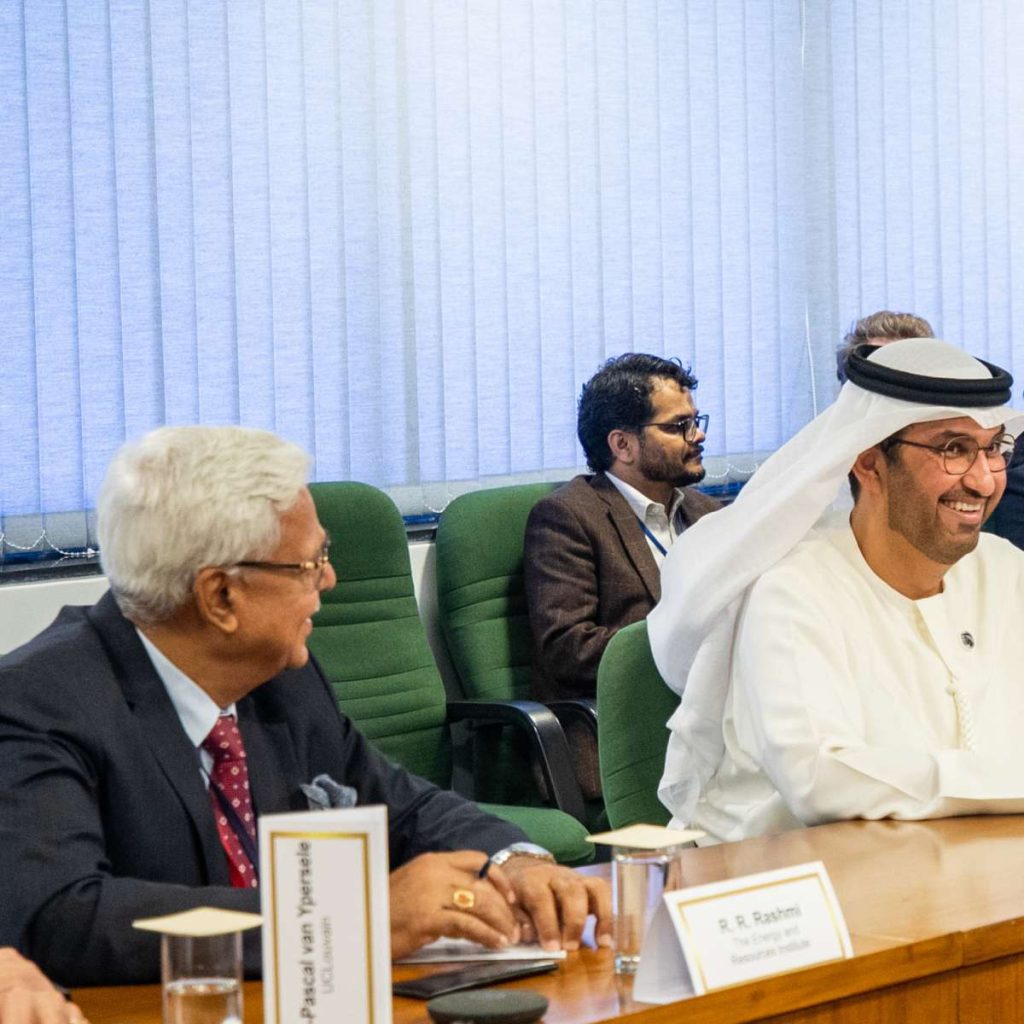
“A key enabler will be the reform of the international financial institutions and multilateral development banks. We must mobilise much more concessional finance to unlock more private sector capital and target investments where they are needed most. As such, scaling and accelerating climate finance will be one of the key goals of the COP28 Presidency, and we will rally all relevant parties in an effort to get it done.”
Al Jaber expressed that progressive climate action represents an immense opportunity for the world: “An opportunity to create millions of jobs and invent new sectors, businesses, and industries. In fact, it will create the greatest leap in human development and prosperity since the first industrial revolution.”
He reaffirmed that the COP28 Presidency would listen to and engage with all stakeholders, bringing everyone to the table and ensuring that no one was left behind. Al Jaber ended his address by highlighting it was partnerships which would make progress towards a sustainable future for all.
“Let’s ensure that progress is truly inclusive… that no one is left behind. Let’s keep 1.5 alive, while putting an end to energy and water poverty. Let’s unite around climate action that carries humanity forward. And let’s prove that you can be pro-climate and pro-growth at the same time,” he said.
“In the months to come, myself and the COP28 team, will continue to listen, consult, and engage with everyone: Everyone from civil society, indigenous peoples, the private sector, governments, women, and youth.”
“Let’s unite everyone around a COP of action and a COP for all. Let’s remember that the world makes progress through partnership, not polarisation.
“Andlet’s follow TERI’s motto: The best way to predict the future is to create it. So, let’s get to work and create a sustainable future together.”
Following his address, on the sidelines of the World Sustainable Development Summit, Al Jaber was presented with the distinguished Alumni Award by the vice-chancellor of The Energy and Resources Institute (TERI), Prateek Sharma. Its first-ever recipient –Al Jaber — was awarded in light of his achievements and contributions to climate action.
“This was a great honour for me personally and a testament to the UAE leadership’s commitment to embed the principles of sustainability into our development as a nation,” Al Jaber said.
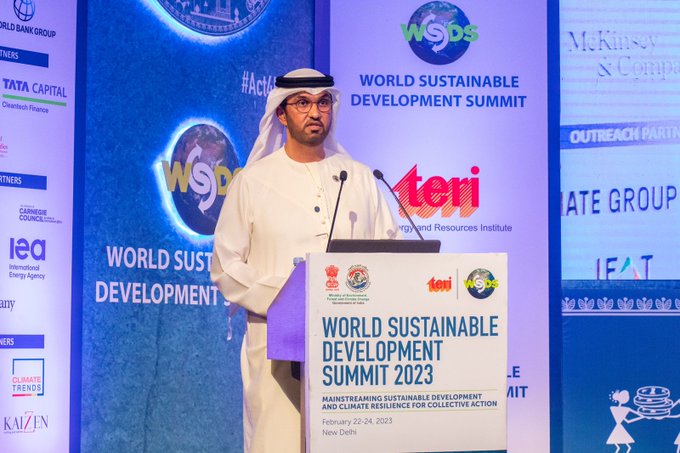
In 2010, while CEO of Masdar, Al Jaber received an honorary doctorate from TERI University’s visionary founder, Rajendra Pachauri.
Al Jaber also held several meetings on the sidelines of the event including with Subrahmanyam Jaishankar, India Minister of External Affairs; Bharrat Jagdeo, Vice- President of Guyana; Bhupender Yadav, Minister of Environment, Forest and Climate Change of India; Naseer Ahamed, Sri Lankan Minister of Environment; Jeffrey Sachs, Director of the Center for Sustainable Development in the Earth Institute and Navdeep Suri, distinguished Fellow of the Observer Research Foundation (ORF). Al Jaber also held a roundtable with several members of civil society including NGOs, multilateral development banks, foundations, think tanks and other representatives.

